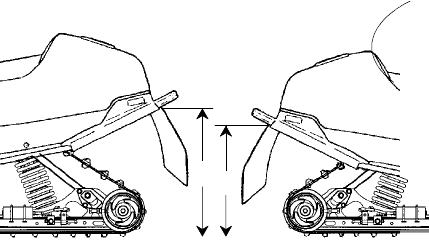
43
THE PERFECT FIT
FAST M-10 Rear Suspension Adjustments
The M-10 suspension has been designed to be very sensitive to rider
weight. Changes in rider weight of 25 lbs. or more might require
appropriate changes in settings. The following information has been
compiled to assist you in tuning your M-10 suspension to its maximum
potential and achieve the best possible ride. Please take the time to
read and understand all the possible adjustments available with the
M-10 suspension.
Static Sag and Ride Height Settings
Static sag describes the difference i n height of the rear bumper from the
suspension’s fully extended position t o its loaded height, with the rider
seated on the s nowmobile.
A good initial starting point is four inches of sag, measured at the rear
bumper. Too much sag will result in bottoming, and too little sag will
result in reduced rider comfort.
Sag travel i s used to control ride quality and rebound travel. On the
M-10 suspension, sag is controlled by t wo settings, t he full range
adjuster (FRA) position and the rear spring preload.
5. To check sag, raise the rear bumper until the suspension i s fully
extended (the rear shock will not extend any further). Measure the
distance from the ground to the bottom of the bumper (dimension
X) as shown in the illustration. Record the measurement.
6. Have the rider sit on the snowmobile and bounce up and down on
the seat a few times to set in the suspension. While the rider
remains seated, measure the distance from the ground to the top of
the bumper (dimension Y) and record it.
7. Subtract Y from X and you will have the SAG setting (X - Y = sag
setting. Example: 21 - 17 = 4). The correct amount of SAG for
the M-10 rear suspension is 3-5 i nches.
If the m easured sag is incorrect, adjust the FRA position and rear
spring preload.
X
Y
Unloaded Loaded


















